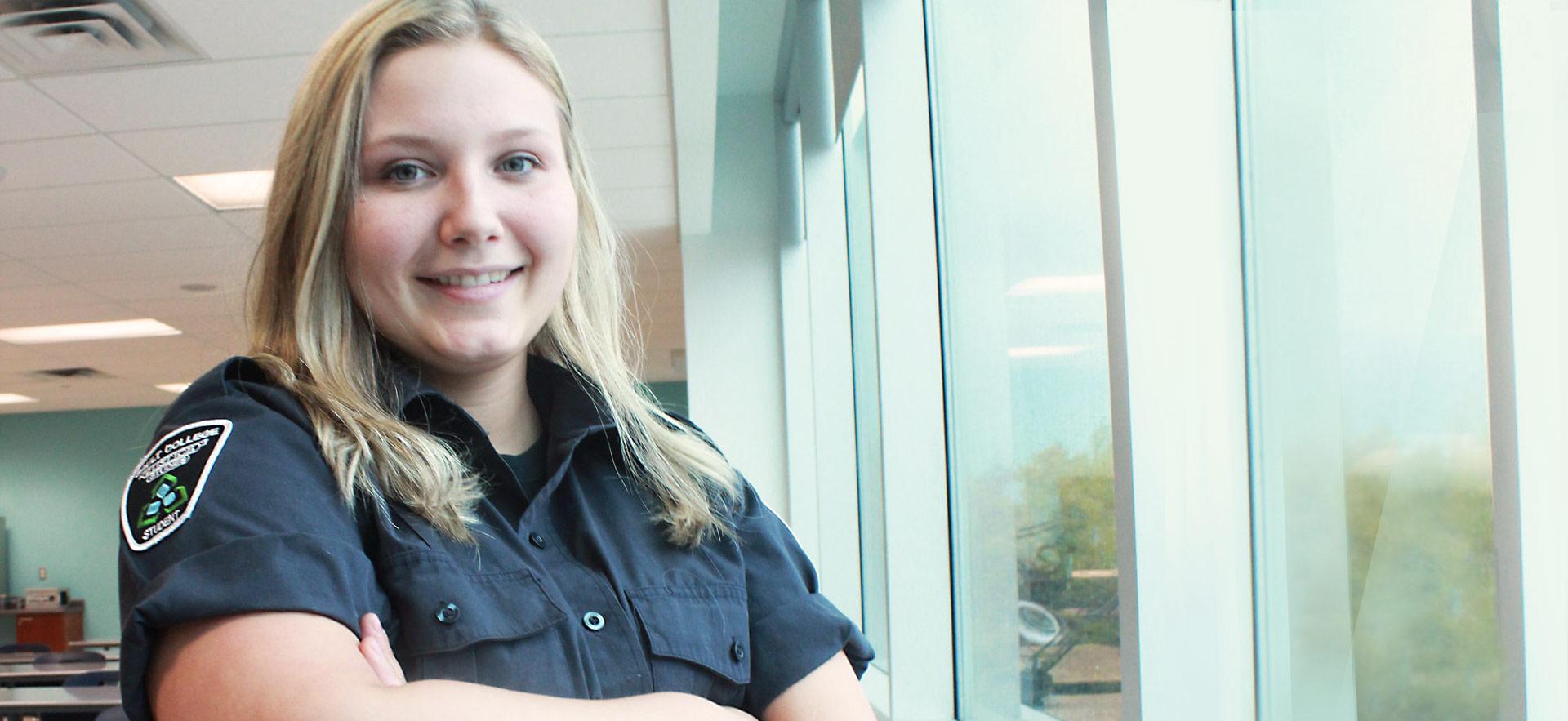Campus Watch
Call or text 705-542-4185
The Sault College Campus Watch Program is a student volunteer program that is aimed to ensure anyone on campus feels safe and comfortable after regular operating hours. The program runs Monday to Friday from 6:00pm until 11:00pm.
The Campus Watch Program offers three services.
Safe Walk Services
The Safe Walk Service is in place for individuals who wish to be accompanied while walking on campus. This can be to a vehicle, a bus stop or to the end of campus. The volunteers will join you on your walk so you don’t have to go alone.
Walk By Services
The Walk By Service is in place for individuals who are on campus after hours and wish to be periodically checked in on by the Campus Watch Volunteers. This can be if you are studying or doing work on campus, having a club/chapter meeting or hanging out with friends. The Campus Watch Volunteers will check in however often you would like to ensure you feel safe and comfortable while on campus.
Campus Walk Patrols
The Campus Watch volunteers do frequent patrols of campus to ensure nothing is unsafe, or needs to be addressed. If you notice something out of the ordinary please contact Campus Security at 705-759-2554 ext. 2712 to report.
Volunteers can be found on campus, or reached by calling or texting the Campus Watch phone at 705-542-4185.
To apply to volunteer with the Campus Watch Program, please complete this application and submit it to campuswatch@saultcollege.ca
Sexual Assault

Starting March 5, 2018 all full time post-secondary students at Sault College will receive a survey email from CCI Research on behalf of the Ontario Government. The Student Voices on Sexual Violence survey is an important tool for gathering information from postsecondary students about their experiences, general attitudes, and beliefs related to personal safety and sexual violence. The survey results will help you and your institution identify and address issues, improve services, build awareness, and update policies and processes related to addressing issues of sexual violence. Read more frequently asked questions.
Sexual violence is a reality on campuses across Canada, at Sault College we are working to ensure our campus community feels safe, comfortable and educated on the topic of sexual violence.
College Supports
Any individual who has experienced or been affected by sexual violence have the following supports available to them.
| Department | Type of Support | Phone | Location |
|---|---|---|---|
| Health, Counselling and Accessibility Centre | Student reporting, investigations, health and counselling services | 705-759-2554 ext. 2703 | F-Wing entrance |
| Human Resources | Employee reporting, investigations, employee assistance | 705-759-2554 ext. 2699 | B1130 |
| Security | Reporting | 705-759-2554 ext. 2712 | F-Wing entrance |
Community Supports
In addition to college supports, Sault College works with local partners to ensure anyone who has experienced sexual violence can receive additional supports. The following supports are in place within the community.
| Service | Phone | Location |
|---|---|---|
| Sault Area Hospital Emergency Department | 705-759-3434 | 750 Great Northern Rd. |
| Sault Are Hospital Sexual Assault Care Centre | 705-759-5143 | 750 Great Northern Rd. |
| Women in Crisis Algoma | 705-759-1230 | 23 Oakland Ave. |
Emergencies
If you or others are in immediate danger, call 911.
Sault Ste. Marie Police Service
705-949-6300
Sault Ste. Marie Ontario Provincial Police Detachment
705-945-6833
Campus Awareness
At Sault College we aim to ensure that all individuals feel safe, comfortable, and aware on campus. We host a variety of Awareness Events on campus to start the conversation about sexual violence. Awareness Weeks are held throughout the year to keep all Sault College community members involved in keeping our campus safe for everyone.
Consent
We understand that talking about consent can be uncomfortable for some. For that reason, we offer support to the Sault College community to ensure everyone understands the importance of consent.
Definition of Consent
The voluntary and explicit agreement to engage in the sexual activity in question. It is the act of willingly agreeing to engage in specific sexual behaviour, and requires that a person is able to freely choose between two options: yes and no. This means that there must be an understandable exchange of affirmative words, which indicates a willingness to participate in mutually agreed upon sexual activity. It is also imperative that everyone understands the following:
- Silence or non-communication must never be interpreted as consent and a person in a state of diminished judgment cannot consent.
- A person is incapable of giving consent if they are asleep, unconscious or otherwise unable to communicate.
- A person who has been threatened or coerced (i.e., is not agreeing voluntarily) into engaging in the sexual activity is not consenting to it.
- A person who is drugged is unable to consent.
- A person may be unable to give consent when under the influence of alcohol and/or drugs.
- A person may be unable to give consent if they have a mental disability preventing them from fully understanding the sexual acts.
- The fact that consent was given in the past to a sexual or dating relationship does not mean that consent is deemed to exist for all future sexual activity.
- A person can withdraw consent at any time during the course of a sexual encounter.
- Where there is a power imbalance, a person may be incapable of giving consent to a person in a position of trust, power or authority, such as a faculty member initiating a relationship with a student who they teach, an administrator in a relationship with anyone who reports to that position.
- Consent cannot be given on behalf of another person.
It is the responsibility of the initiator of sexual activity to ensure clear and affirmative responses are communicated at all stages of sexual engagement. It is also the initiator’s responsibility to know if the person they are engaging with sexually is a minor.
SC Sexual Violence & Assault Policy Page
Upstander

Upstander Programming was developed at Western University. It is important programming that was adopted at Sault College as a tool to equip students with the knowledge and skills to identify risky situations and develop the confidence to intervene safely. This programming is delivered to all students living in residence, all varsity athletes, student leaders on campus, some programs, and is offered at various times throughout the year for the entire student body.
Upstander Programming aims to develop a culture of looking out for one another on campus. Upstander Programming is rooted in Bystander Training programs, which are specifically focused to educate people to be proactive in helping others in need. The training examples and scenarios relate specifically to sexual violence, but can be applied to a number of situations a student may face while in college.
Through training programs, educational videos, awareness weeks, and Campus Watch, we seek to develop a campus community where students and staff are equipped with skills to intervene in any situation that may negatively impact any individual or the Sault College community as a whole.
Examples of being an Upstander could include:
- creating a distraction to break up a heated argument between two strangers,
- calling for help if someone is passed out from drinking beyond their limits,
- offering help if you see someone struggling to carry all their belongings,
- picking up litter you may see on campus, or
- telling your RA that you're concerned about your roommate who is having trouble fitting in.
We ask students to remember this call to action: If you See Something, Do Something.
